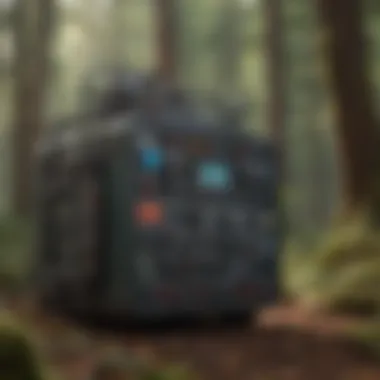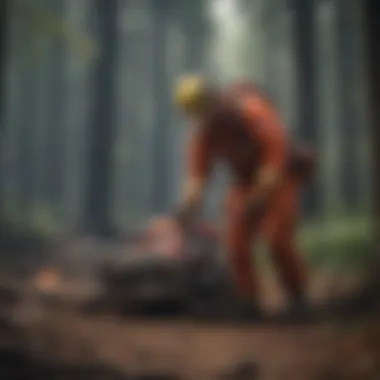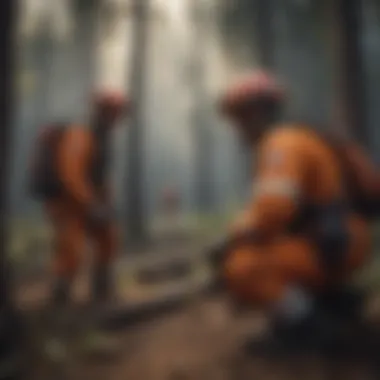Unveiling the Crucial Role of Fireline Medics in Wildland Firefighting Operations


This article delves into the crucial role of fireline medics in wildland firefighting operations. It highlights the specialized skills and training required for this demanding role, as well as the challenges and rewards faced by these frontline medical professionals in the heat of wildfires.
Fireline Medics: Unsung Heroes of Wildland Firefighting
As wildfires rage across rugged terrains, fireline medics stand at the forefront of emergency medical care within these intense landscapes. Their role transcends traditional medical practice, requiring a unique blend of wilderness survival skills and specialized medical training. From treating acute injuries to providing life-saving interventions amidst smoke and flames, fireline medics exemplify courage and resilience in the face of danger.
Training and Readiness
Equipped with advanced medical training tailored for the challenges of wildland environments, fireline medics undergo rigorous preparation to handle a wide array of medical emergencies. Their expertise ranges from basic life support techniques to advanced trauma care, ensuring the well-being of firefighters and civilians caught in the path of destruction.
Equipment and Tools
Carrying essential medical supplies such as trauma kits, burn dressings, and essential medications, fireline medics navigate treacherous terrain to reach injured individuals swiftly. Their gear is specialized to withstand harsh conditions, allowing them to deliver critical care under the most challenging circumstances.
Collaborative Efforts
Working closely with firefighting teams, fireline medics provide integrated support to ensure a seamless response to emergencies in the field. Their coordination with incident commanders and fellow first responders contributes to the overall effectiveness of firefighting operations, showcasing the importance of teamwork and communication in high-stress environments.
The Uphill Battle: Challenges and Rewards of Fireline Medics
Navigating through dense smoke, extreme heat, and rapidly changing fire behavior poses immense challenges for fireline medics. Despite the physical and emotional toll of their work, these dedicated professionals find profound satisfaction in making a difference during crises. The bond forged between fireline medics and those they serve underscores the human capacity for compassion and determination in the face of adversity.
Emotional Resilience
Witnessing the devastation caused by wildfires can take a toll on the mental well-being of fireline medics. It requires a steadfast resolve and a supportive network to cope with the trauma and stress inherent in their line of work. Their ability to remain focused and effective amidst chaos reflects their unwavering commitment to saving lives and protecting communities.
Lifesaving Moments


Every rescue and successful intervention serves as a testament to the skill and dedication of fireline medics. Whether stabilizing a critically injured firefighter or assisting an endangered civilian, these moments of triumph underscore the indelible impact of their presence on the front lines of disaster. Each life saved is a victory won through courage and expertise honed in the crucible of wildfire.
Reflections on Service
As the embers fade and the smoke clears, fireline medics reflect on the challenges overcome and the lives touched by their unwavering service. Their commitment to duty and unwavering resolve in the face of danger epitomize the selflessness and valor required to protect and heal amidst the flames. Their legacy as unsung heroes of the wildland firefighting scene endures as a beacon of hope and inspiration in the aftermath of destruction.
Introduction
Understanding Fireline Medics
Understanding fireline medics is paramount to grasping the intricacies of their responsibilities. Fireline medics are highly trained medical professionals who operate within the frontlines of wildland fires, tending to the medical needs of firefighters and addressing emergencies in immensely challenging conditions. Their expertise extends beyond traditional emergency medical response, as they must navigate through rugged terrains, smoke-filled air, and intense heat to provide life-saving medical care. These individuals exemplify resilience, quick thinking, and unwavering dedication to preserving human life amidst the chaos of wildfire scenarios.
Significance of Medical Support in Wildland Firefighting
The significance of medical support in wildland firefighting cannot be overstated. As wildfires rage across terrains, the presence of fireline medics becomes a critical factor in preserving the health and safety of firefighting personnel. Their timely interventions can mean the difference between life and death for those injured or affected by the unforgiving elements of a wildfire. Moreover, fireline medics play a pivotal role in mitigating health risks, preventing further complications, and ensuring that firefighters receive the necessary medical attention promptly. Their presence not only safeguards the physical well-being of individuals on the frontline but also contributes to the overall effectiveness and efficiency of firefighting operations.
Overview of Wildland Firefighting
Wildland firefighting represents a unique and demanding field that requires specialized skills and protocols. Unlike structural firefighting, wildland firefighting involves combating fires in outdoor settings, often spanning vast areas with rugged terrains and challenging environmental conditions. The tasks of containing and extinguishing wildfires are complex and multifaceted, involving strategic planning, coordination among firefighting teams, and adaptation to rapidly changing fire behavior. Firefighters operating in wildland settings face risks ranging from burns and smoke inhalation to physical exhaustion and dehydration, underscoring the need for comprehensive medical support systems such as fireline medics to ensure the well-being of personnel and the success of firefighting missions.
Role of Fireline Medics
For this article, delving into the crucial role of fireline medics in wildland firefighting operations is imperative. Fireline medics play a pivotal role in providing essential medical support to firefighters battling intense wildfires. Their presence ensures that immediate medical attention is available in potentially hazardous settings, enhancing the overall safety and well-being of firefighting teams. By highlighting the specialized skills and unique challenges that fireline medics face, this section aims to shed light on the critical importance of their role in the seamless operation of wildland firefighting missions.
Medical Expertise and Emergency Response
The section focusing on the medical expertise and emergency response capabilities of fireline medics delves into the depth of knowledge and skills required to tackle medical emergencies in high-stress environments. Fireline medics must possess advanced medical training to assess, stabilize, and treat injuries effectively amidst the chaos of a wildfire. Their ability to make split-second decisions and administer life-saving interventions can mean the difference between life and death for injured firefighters. This subsection explores the intensive training programs and continuous education necessary for fireline medics to maintain their proficiency in providing swift and accurate medical care in the face of unpredictable challenges.
Navigating High-Risk Environments


In the realm of wildland firefighting, fireline medics are tasked with navigating treacherous terrains and unpredictable fire behavior to reach injured personnel swiftly. This subsection delves into the inherent risks and dangers that fireline medics confront while operating in high-risk environments. From rugged landscapes to rapidly changing weather conditions, fireline medics must showcase exceptional situational awareness and adaptability to ensure the successful evacuation and treatment of injured individuals. By illustrating the unparalleled courage and resilience required to work effectively in these extreme conditions, this section highlights the unwavering dedication of fireline medics in mitigating risks and saving lives.
Supporting Firefighters on the Frontline
The frontline of a wildfire presents a myriad of challenges for firefighters, making the presence of skilled medical professionals indispensable. Fireline medics serve as pillars of support for frontline firefighters, offering not only medical expertise but also emotional and psychological assistance during high-stress situations. This subsection emphasizes the collaborative relationship between fireline medics and firefighters, showcasing how their cohesive teamwork enhances the overall effectiveness of wildfire response efforts. Through detailed insights into the integral role fireline medics play in bolstering the morale and resilience of firefighting teams, this section underscores the profound impact these medical professionals have on ensuring the well-being and operational success of frontline personnel.
Training and Qualifications
In the realm of fireline medics, adequate training and qualifications are imperative to ensure effective performance in the high-pressure environment of wildland firefighting. The specialized nature of this role demands a rigorous and comprehensive approach to preparing individuals to handle medical emergencies in challenging terrains. One of the key elements underpinning the significance of training and qualifications is the need for fireline medics to possess a deep understanding of not only basic medical procedures but also the specific protocols and practices tailored to wildland firefighting scenarios. Mastery of these specialized skills equips fireline medics to navigate the complexities of on-site medical interventions with precision and efficiency, ultimately contributing to the well-being of both firefighters and civilians.
Specialized Training Programs
Specialized training programs play a pivotal role in shaping the competencies of fireline medics, honing their abilities to respond swiftly and effectively to diverse medical emergencies amidst the volatile backdrop of wildfires. These programs are designed to equip individuals with the latest medical practices, situational awareness techniques, and decision-making skills essential for mitigating risks and saving lives in the dynamic environment of wildland firefighting. By immersing participants in simulated scenarios that replicate real-life challenges, specialized training programs cultivate a proactive mindset and a rapid response capability crucial for optimal performance on the frontline.
Certifications and Requirements
Attaining relevant certifications and meeting stringent requirements are fundamental milestones that ascertain the preparedness and competency of fireline medics in fulfilling their pivotal role on the frontline. Certification processes validate the acquisition of necessary skills and knowledge, ensuring that individuals are well-versed in critical medical procedures and emergency protocols. By adhering to set requirements, fireline medics demonstrate their commitment to maintaining high standards of practice and upholding the integrity of their profession, reinforcing the trust placed in them by firefighting teams and the broader community.
Hands-On Experience and Simulation Exercises
Hands-on experience and simulation exercises form an integral part of the training regimen for fireline medics, offering practical learning opportunities that bridge theoretical knowledge with applied skills. These exercises not only enhance proficiency in crucial medical techniques but also foster adaptability and quick thinking in high-stress situations typical of wildland firefighting incidents. By engaging in hands-on experiences that mirror the uncertainties of real emergencies, fireline medics cultivate resilience, resourcefulness, and teamwork, qualities that are indispensable for successful outcomes in the complex landscape of wildland firefighting operations.
Challenges Faced by Fireline Medics
In the realm of wildland firefighting, the challenges encountered by fireline medics play a crucial role in ensuring the safety and well-being of personnel on the frontline. The topic of challenges faced by fireline medics is paramount in this article as it sheds light on the demanding nature of their responsibilities and the resilience required to navigate through intense firefighting scenarios. Delving into the specific elements of these challenges provides a comprehensive understanding of the unique circumstances faced by fireline medics and the measures they must undertake to overcome them.
Physical and Mental Demands


The physical and mental demands placed upon fireline medics are immense, requiring them to exhibit peak physical fitness and unwavering mental fortitude to deliver effective medical care in high-stress environments. The arduous terrain, extreme weather conditions, and prolonged hours create a physically taxing scenario where medics must possess robust stamina and agility to carry out their duties efficiently. Furthermore, the emotional toll of witnessing devastation and potential loss of life necessitates a high level of mental resilience to remain composed and focused amidst chaos. Understanding the demanding nature of these physical and mental challenges is essential in comprehending the true essence of the fireline medic's role and the sacrifices they make to safeguard others.
Risk of Injury and Exposure
Fireline medics face a constant risk of injury and exposure to hazardous conditions while operating in the wilderness amidst raging wildfires. The unpredictable nature of fire behavior, falling debris, and inhaling smoke present potent threats to the safety of medics, requiring them to constantly assess risks and implement preventive measures to mitigate potential harm. Moreover, the exposure to extreme heat, toxic fumes, and hazardous terrain elevates the vulnerability of medics to injury, accentuating the critical importance of adhering to strict safety protocols and leveraging protective gear to minimize risks. Understanding the inherent dangers associated with firefighting environments underscores the courage and selflessness exemplified by fireline medics in braving perilous conditions to provide essential medical support.
Maintaining Medical Supplies and Equipment
The continuous supply and maintenance of medical equipment and supplies pose logistical challenges for fireline medics operating in remote wilderness areas with limited resources and infrastructure. Ensuring the availability of vital medical supplies such as medications, bandages, and life-saving equipment is imperative for medics to deliver prompt and effective care to individuals in need. Moreover, the proper upkeep and sterilization of equipment amid rugged conditions and varying temperatures demand meticulous attention to detail and organizational skills to prevent equipment malfunctions and contamination. The strategic planning and resource management involved in maintaining medical supplies and equipment highlight the resourcefulness and adaptability essential for fireline medics to surmount operational hurdles and deliver optimal medical assistance in exigent circumstances.
Rewards and Impact
In the realm of wildland firefighting, the segment focusing on Rewards and Impact plays a pivotal role in understanding the significant contributions made by fireline medics. This section sheds light on the intrinsic value that fireline medics bring to the forefront of firefighting operations. By delineating key elements of Rewards and Impact, this article showcases how these professionals are not only crucial in emergency response scenarios but also in fostering a culture of safety and support within the firefighting community. The primary focus here is to accentuate how the dedication and expertise of fireline medics translate into tangible benefits for both firefighters and the operation at large.
Saving Lives and Mitigating Risks
Delving into the core aspect of Saving Lives and Mitigating Risks, it becomes evident that the role of fireline medics extends beyond the immediate care provided on the field. Through strategic interventions and rapid medical response, these professionals showcase unparalleled commitment to preserving life amidst the chaos of wildfires. Mitigating risks goes hand in hand with their ability to assess situations swiftly and apply critical medical care when every second counts. This subsection highlights how the unwavering dedication of fireline medics directly translates into saving lives and ensuring the safety of firefighting teams in high-stakes environments.
Contributing to Operational Success
The section on Contributing to Operational Success underlines the integral part fireline medics play in the overall efficacy of firefighting campaigns. Their expertise in medical emergencies not only safeguards the well-being of individuals on the frontline but also enhances the operational efficiency of the entire firefighting mission. By addressing medical concerns swiftly and effectively, fireline medics bolster the resilience and effectiveness of firefighting teams, ensuring smooth coordination and successful outcomes. This segment showcases how their contribution goes beyond medical intervention to encompass a broader impact on operational success and mission accomplishment.
Building Resilience and Camaraderie
The aspect of Building Resilience and Camaraderie encapsulates the essence of teamwork and support fostered by fireline medics within firefighting units. Beyond the immediate medical assistance they provide, fireline medics act as pillars of strength, instilling resilience and camaraderie among team members facing adversities in the line of duty. Their unwavering presence and unwavering support contribute significantly to the mental and emotional well-being of firefighters, creating a cohesive environment that boosts morale and solidarity. This section highlights how the presence of fireline medics goes beyond medical expertise to nurture a sense of resilience, camaraderie, and unity among frontline responders.
Conclusion
The conclusion not only underscores the complex nature of the tasks undertaken by fireline medics but also sheds light on the unwavering commitment and resilience required to navigate the high-risk environments of wildfires. It emphasizes the life-saving interventions, mitigation of risks, and the indispensable contribution fireline medics make to the welfare and effectiveness of firefighting teams. By acknowledging the sacrifices and dedication of these frontline medical professionals, the conclusion reinforces the fundamental role they play in ensuring the success and safety of wildland firefighting operations.
Vision for the Future of Fireline Medics
Looking ahead, the future of fireline medics holds both challenges and opportunities in the evolving landscape of wildland firefighting. As technology advances and fire dynamics change, the role of fireline medics will undoubtedly adapt to meet the demands of increasingly complex fire environments. Ensuring that fireline medics receive ongoing training in the latest techniques and technologies will be critical to their effectiveness in providing medical support in high-stress settings.
The vision for the future of fireline medics lies in enhancing collaboration among various agencies, improving communication systems, and implementing cutting-edge medical practices to optimize emergency response in wildfire incidents. Furthermore, exploring new strategies for mitigating risks, integrating data-driven decision-making processes, and incorporating mental health support for fireline medics will be integral to enhancing their overall well-being and performance.



